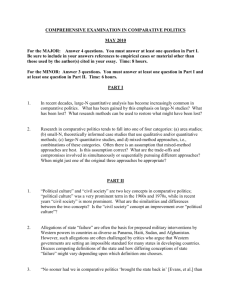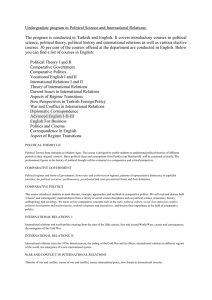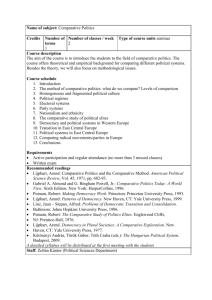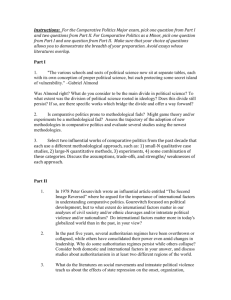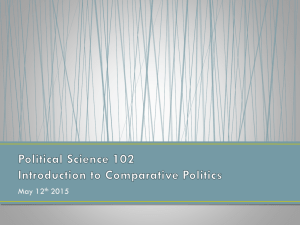August 2014
advertisement
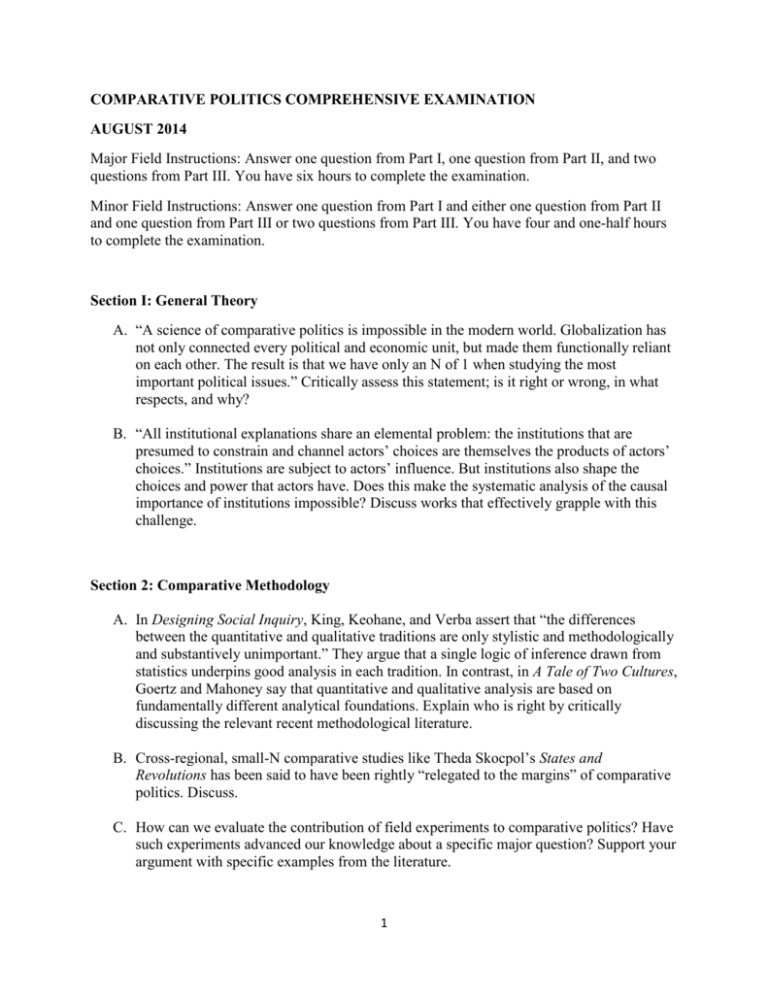
COMPARATIVE POLITICS COMPREHENSIVE EXAMINATION AUGUST 2014 Major Field Instructions: Answer one question from Part I, one question from Part II, and two questions from Part III. You have six hours to complete the examination. Minor Field Instructions: Answer one question from Part I and either one question from Part II and one question from Part III or two questions from Part III. You have four and one-half hours to complete the examination. Section I: General Theory A. “A science of comparative politics is impossible in the modern world. Globalization has not only connected every political and economic unit, but made them functionally reliant on each other. The result is that we have only an N of 1 when studying the most important political issues.” Critically assess this statement; is it right or wrong, in what respects, and why? B. “All institutional explanations share an elemental problem: the institutions that are presumed to constrain and channel actors’ choices are themselves the products of actors’ choices.” Institutions are subject to actors’ influence. But institutions also shape the choices and power that actors have. Does this make the systematic analysis of the causal importance of institutions impossible? Discuss works that effectively grapple with this challenge. Section 2: Comparative Methodology A. In Designing Social Inquiry, King, Keohane, and Verba assert that “the differences between the quantitative and qualitative traditions are only stylistic and methodologically and substantively unimportant.” They argue that a single logic of inference drawn from statistics underpins good analysis in each tradition. In contrast, in A Tale of Two Cultures, Goertz and Mahoney say that quantitative and qualitative analysis are based on fundamentally different analytical foundations. Explain who is right by critically discussing the relevant recent methodological literature. B. Cross-regional, small-N comparative studies like Theda Skocpol’s States and Revolutions has been said to have been rightly “relegated to the margins” of comparative politics. Discuss. C. How can we evaluate the contribution of field experiments to comparative politics? Have such experiments advanced our knowledge about a specific major question? Support your argument with specific examples from the literature. 1 Section 3: Applied Theory A. Critically assess the role of inequality as an independent variable affecting democratic transitions and stability. Make certain to consider how political scientists’ understanding of the impact of inequality may have changed over time. B. A growing literature focuses on institutions under authoritarian regimes. Evaluate this scholarship in at least two ways. First, identify and assess the chief debates within this literature. Second, discuss the contributions this scholarship has made to the understanding of institutional change and stability in general. Be sure to refer to specific works and cite relevant evidence. C. Some explanations of ethnic conflict are founded on the premise that actors’ identities are “primeval, original, primitive, or fundamental,” with “a certain ineffable significance… attached to the tie of blood.” Others argue that it is necessary to take a more constructivist approach to understanding ethnic conflict. Evaluate the strengths and weaknesses of each position using empirical examples from at least two countries to support your arguments. D. Charles Tilly famously claimed that states made war and war made the state. Should this claim continue to motivate theorizing about the causes of state formation? E. Mainwaring wrote, a decade and a half ago in Rethinking Party Systems in the Third Wave of Democratization, that most of the classic, ostensibly general work on parties and party systems (such as Duverger and Sartori) rests on the assumption that the parties and systems in question are relatively highly institutionalized. Given highly diverse party politics in the years since Mainwaring wrote, assess the value of his observation. Compare individual parties and system-level dynamics in at least one established democracy and one relatively newer democracy. F. A large literature addresses the relationship between political regimes and economic development. Does democracy cause economic growth? Identify and explain the mechanisms which are posited to connect institutions to growth and draw on the results from this literature to support your argument. 2


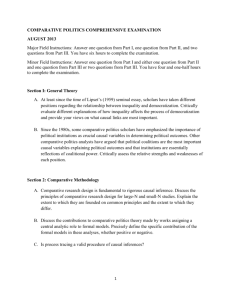
![Comparative Politics (GS 161) Test # 1 Terms and Lim [Handout])](http://s2.studylib.net/store/data/011707684_1-fe811697b4f1a95514b5eff13fe07ae7-300x300.png)

